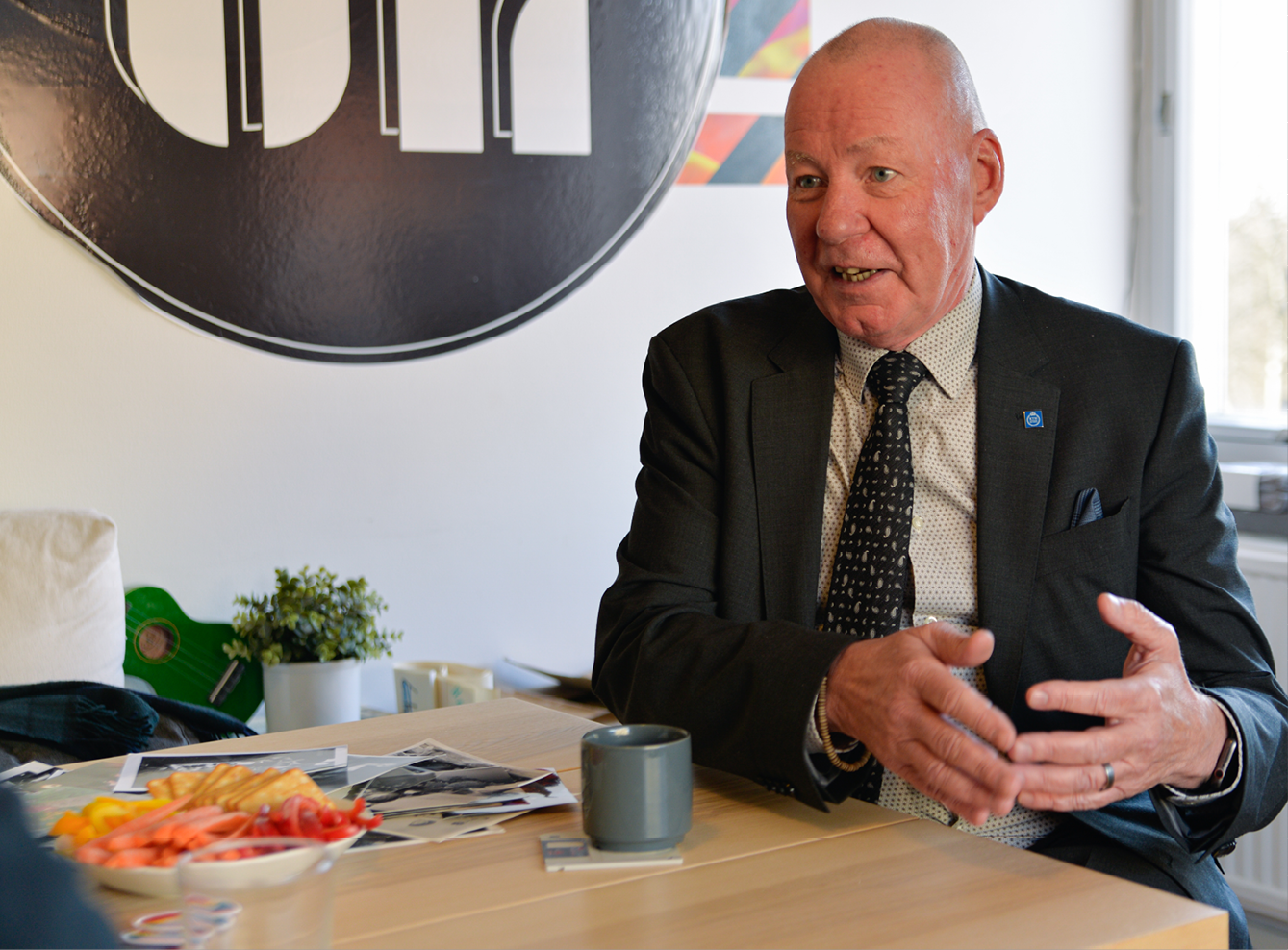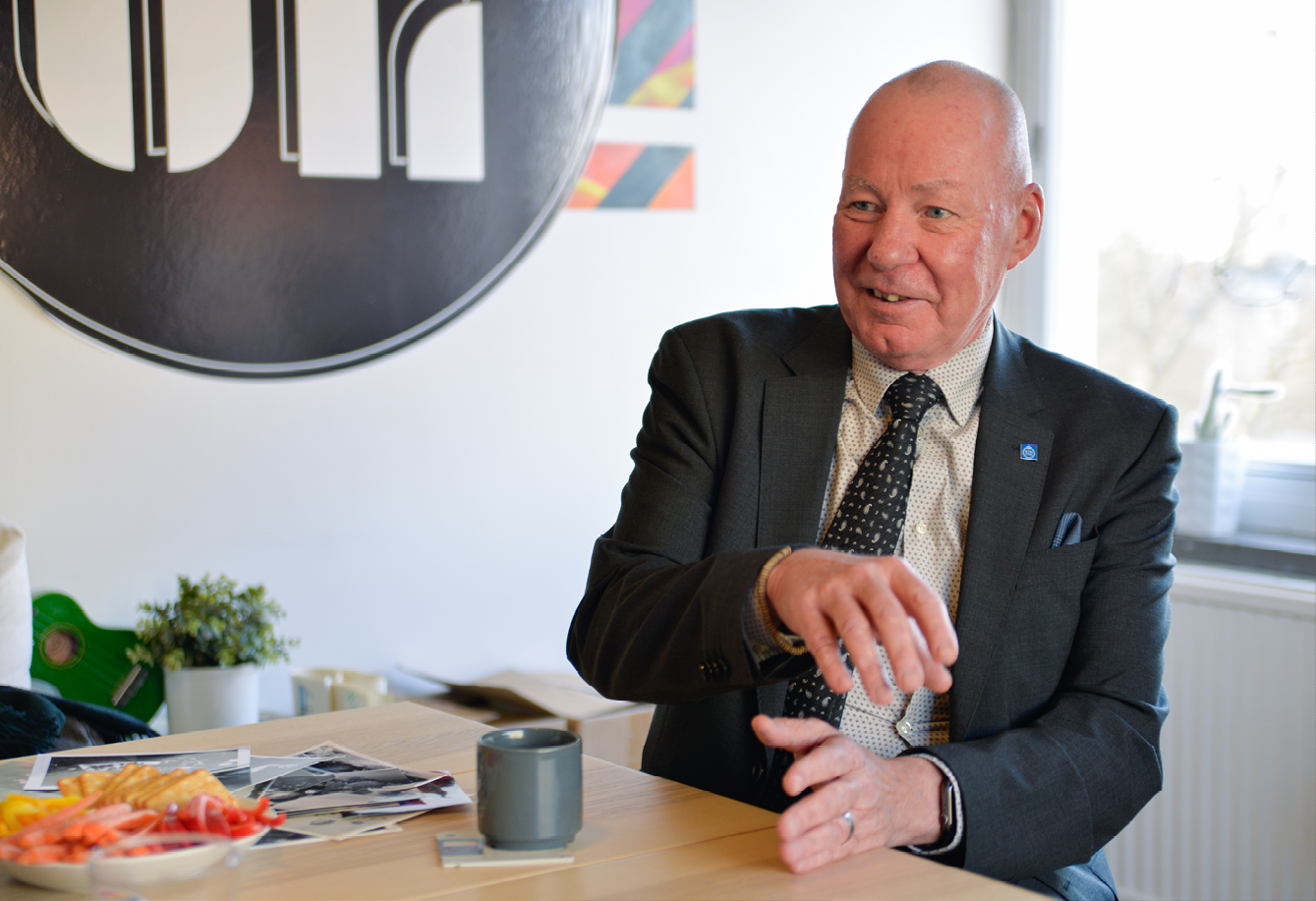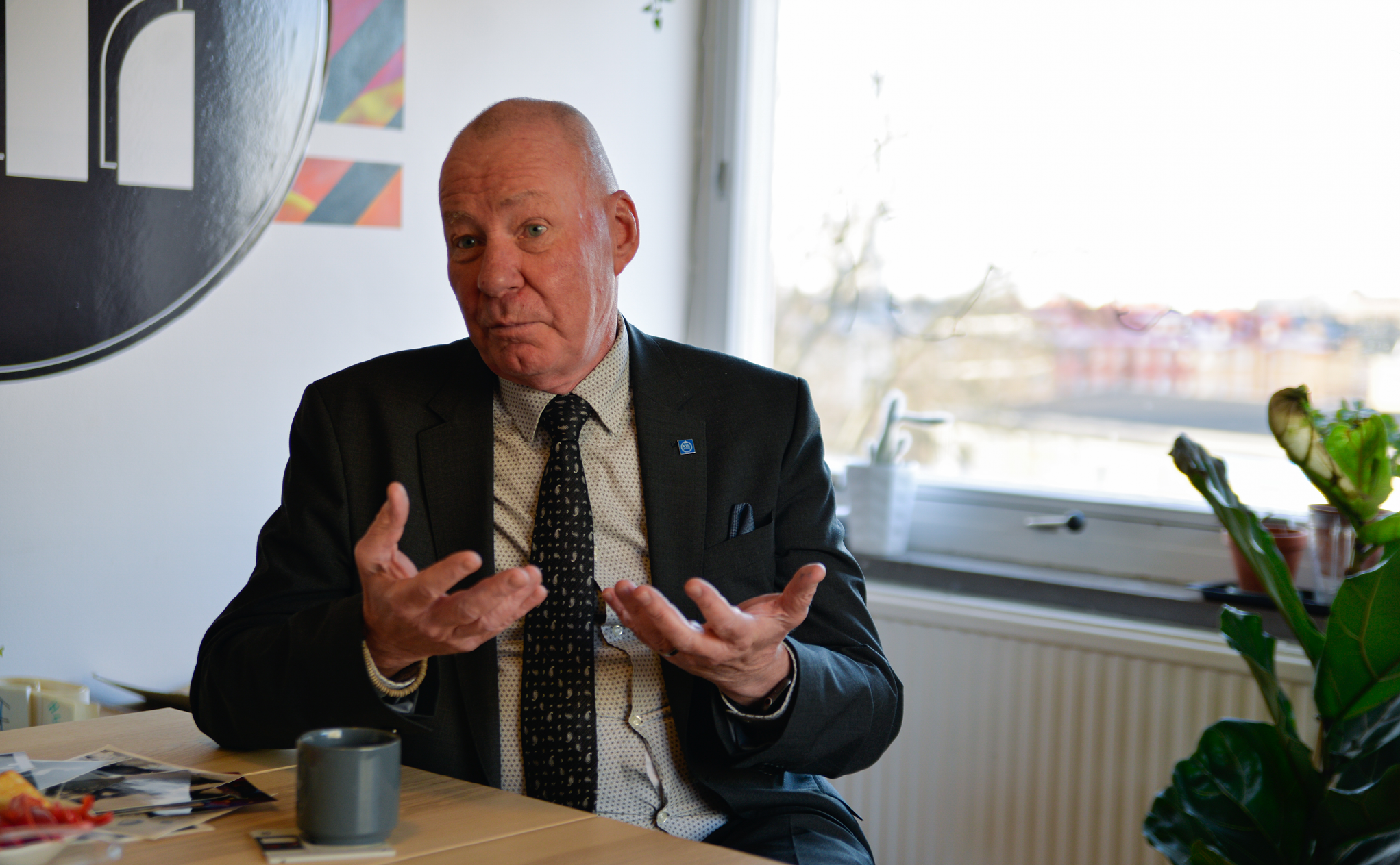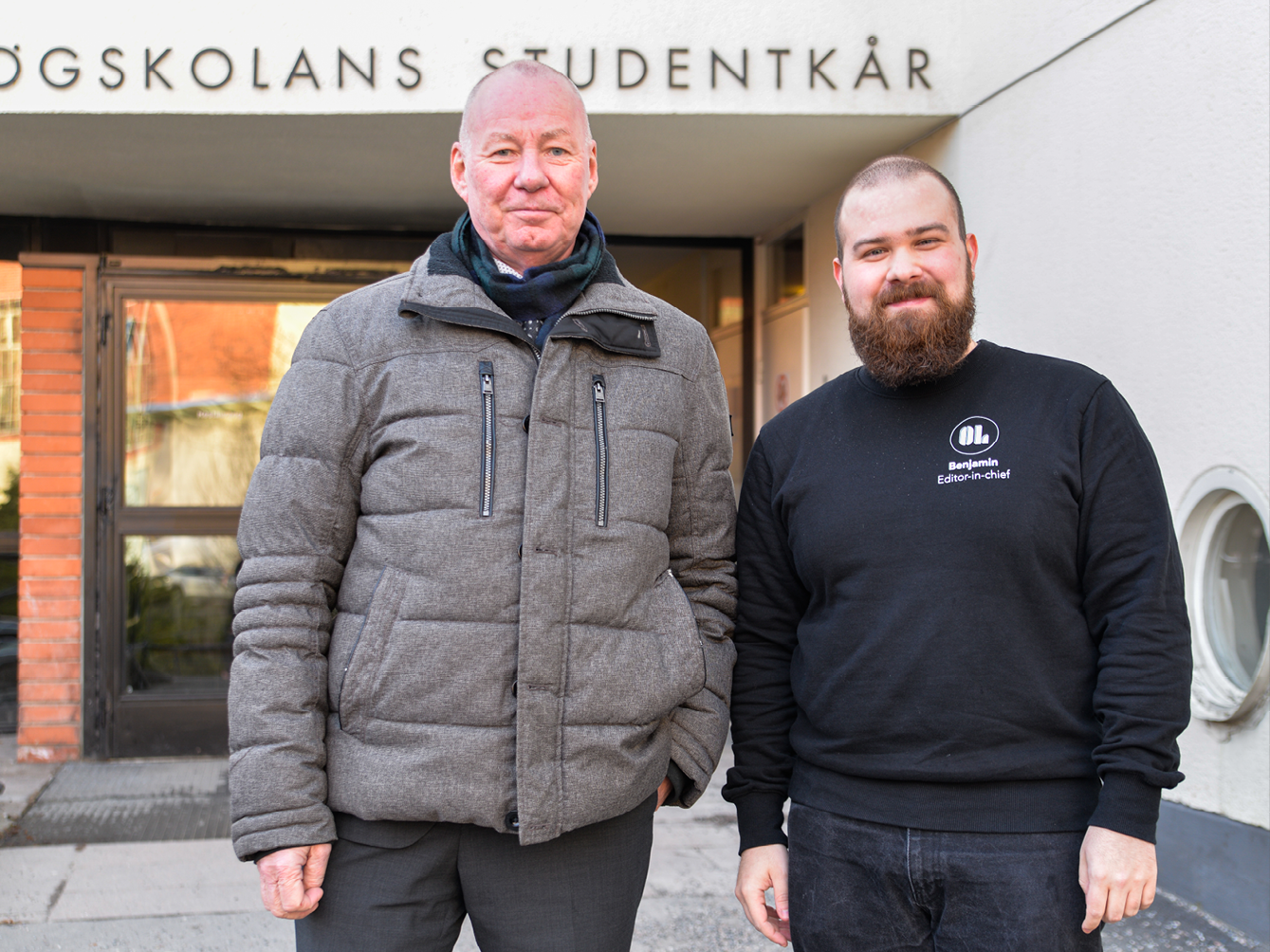Meet Anders Söderholm
Benjamin Javitz - Authorbenjamin.javitz@osqledaren.se
Osqledaren - Photographerosqledaren@ths.kth.se
When KTH gets a new president, it is in fact a big deal. The President of KTH is chosen in a long process and finally appointed by the Swedish government - and with him come several changes in the university management that impact us all. Osqledaren interviewed Sigbritt Karlsson when she started her term as President in 2016. Continuing the tradition, we wanted to sit down with Anders Söderholm as well. Read the interview here.
It is cold outside the entrance to Nymble at Drottning Kristinas väg 19, but not cold enough to contain my excitement as I wait for Anders Söderholm, the new President of KTH. He is a very busy man - I see him finishing up his previous meeting on the other side of the street before he waves and crosses the street to greet us. This afternoon in late January was the only free timeslot in his calendar. “Osqledaren, right? Nice to meet you!”, he says and is happy to take a few photos before we go inside. “Can I take one for my social media as well?”, he adds. A day later, I find his selfie on LinkedIn and Twitter: “Tricky questions and hopefully some good answers,” he wrote. Do you agree?
We take the stairs up to the third floor of Nymble and sit down in the Osqledaren office. On the table lie magazines from both the 60s and as recent as last year. Photos of parties, pubs and Anders’ predecessors. And a plate of carrot and cucumber sticks, bell pepper and Göteborgs saltiner - “I’ll have the carrots,” Anders said in our Q&A-session in May 2022 - of course we remembered. I start the recorder placed between us on the table, nervously stumble over my own words, then jump right in the deep end:
How do you think we as regular students are going to see your work? How are you going to influence us as students?
Well, that's a difficult question. I think that in the everyday life of students, you are sort of in the hands of our instructors and professors - and that's where you should be. You shouldn't be dependent on the President of KTH for your daily work, but maybe in a longer term we could work on how to design the portfolio of educations, what kind of prerequisites we provide for the students. That is something that we as a university management team could provide better conditions for hopefully.

How do you think that work will be cooperative with the students and with THS? How do you see that relationship?
The students are part of the university development, of course, and by law, you have to be included in all kinds of decision-making processes. I think we are in a situation where we don't just do that because we have to, but because we think that students can have important knowledge. I have a lot of cooperation with the President of THS and her colleagues, and then it sort of carries down on each level. Hopefully that is how the influence from the students can contribute to the university on each level.
Do you think students should have a lot of influence on their education?
Yes, of course. In several ways, there is the responsibility for the professors to know what kind of education is needed in the labour market today, and more importantly beyond today. That is an expertise that we require the professors to have and demonstrate. They should be able to discuss that with the students, but they also have or should have that knowledge as part of their profession. So that is one thing. But the other thing is the here and now and what kind of teaching we provide, what kind of measurements we use to create learning situations. And that is a much more direct one-to-one discussion among students and professors.
And that involves a lot of feedback from the students.
Of course. I know that we are not doing 100% right in terms of collecting student opinions. I saw some reports on how well we feed that information back to the students. I think that is one of the areas where there is some work to do.

I also want to talk about student life on campus. How do you remember your student life and how did it look like compared to what you see at KTH?
I studied my undergraduate and graduate in Umeå which I would say looks like a small town American campus, with a lot of green areas between the university buildings. Here the university is together, but it's still part of the city. KTH Campus is much more lively and there are more people moving around, and it's also a closer connection to the city than what I experienced as a student. So I hope we can continue having the city at campus. Not destroying the campus, but sort of making use of having the city close.
What are some of the memories you have from your student life that you look back to?
Oh, those were different times. But, you know, understanding that this time at the university is like a transfer period for a future brighter life. And using that period to enhance yourself, not only through the studies but also through extracurricular activities. Really understand what you do now is something unique, that you will not be able to do later in life.
I think I was one of the students that maybe did not understand fully the potential that student life could actually have. So, if given the chance to go back, I would volunteer more for political or association work or whatever to enrich that period. I was much more focused on studies and getting in and out of this as fast as possible with the highest grades possible.
You kind of build yourself as a person. I was very focused on studying my main subject, but I think you have a possibility to use other parts of the campus than those included in your curriculum. Like adding other aspects, language, or if you're in mechanical engineering, maybe some chemistry? Sort of build that into your CV or other activities that add to what you have in your portfolio. That would be my advice.
Have you seen something at KTH or have you heard about something when it comes to student life and social activities and pubs and events that you're already fascinated and excited about? Can we expect to see you at Quarnevalen or a spex or a gasque?
I have a number of social events from THS in my calendar. But I haven't been to any of those yet. So, I'm still waiting to see what that is. But I have tickets for a spex! For Quarnevalen I have travelling plans that week but I will be able to attend some of the activities at least. And Kårsillis [yearly lunch between the leaderships of THS and KTH], that’s also in the calendar.
When your predecessor Sigbritt Karlsson started, we also had an interview with her. We talked especially about the reception, which is for many students one of the most intensive and most important periods of their first year. For many it's also something they go back to a lot. When we talked to Sigbritt, she had concerns about how the parties and the social activities could overshadow some of the serious work that the student union should do. Do you have similar concerns?
Not really. I think if you go maybe 30 years back, there could be a lot of penalizing and a lot of drinking which could be harmful for the individual. But as I understand it, and that's my experience, not only from here, these things are not there anymore. Now it's a welcoming, inclusive period where the students are welcomed to campus. And I think the Student Union does tremendous work to make the newcomers feel included. I would say that these activities are an integral part of starting your study period here.

I also want to go back to Janne Carlsson, who was also one of your predecessors in the 90s. He wrote a debate article in 1994 that criticized parts of the reception and said that the phös with their “dark sunglasses and very violent behavior” should stop that and that they “create associations to bad groups within our society.” Today, they still walk around with their black sunglasses. What do you think?
Basically I trust you to do a good job and to have a solid judgement on where the balance is between being welcoming and excluding people. I trust you guys to to being able to make that judgement.
Do you think that KTH should have influence on how the reception is organized?
I think we have a joint interest in having a good reception and by acknowledging THS as the student union at KTH, we have the possibility to discuss what kind of activities are expected to be performed by the Student Union. As far as I can see, that is enough in terms of influence. I guess there is a need for joint planning of the activities in the beginning of the semester, in order not to interfere with each other. If that is a concern, we can solve that through having a joint running.
One of the biggest receptions that we have is the international reception. This last fall they welcomed about 1700 new students with a lot of events and planning and organization. But there has been increasing frustration about how the cooperation with KTH works. There are planning-related meetings at KTH to which international students are invited, that are held entirely in Swedish. What do you think about that?
Generally I would say if you have a meeting of that kind you should speak English. That should be the bottom line.
What are your plans for internationalization and how to integrate Swedish and international students? International students make up 30% to 40% of students and about 70% of students are in a program where they are going to do a Master's in English, but international students still sometimes feel excluded or treated differently. How do you plan to tackle that? I’ll give an example. I had a class where it felt like the Swedish students got more information from the professor because they were able to speak Swedish with them. I sometimes heard them talking - I can understand Swedish to an extent - and then you'll hear them talking about the exam and what kind of things are important for the course. Then you do feel excluded.
Hmm, I have to take that home for consideration. But generally speaking, if you have an international environment - for many masters programs around 50% of the students are international - you have to work in an international environment with all the things that are included, such as the language. Of course, it's easy to switch back to Swedish if you're speaking Swede to Swede. I'm not sure there will be a 100% solution to that, but in terms of information that is of essential value for the students, it should of course be available for everybody. It's something we need to learn to consider and and be aware of, but also creating channels for international students to voice their concerns in the classroom or in the program.
I think that there's not really a great solution for this whole problem. There's not going to be a way to speak a common language and everyone understands each other. If everything was in English, there would be Swedish students that feel excluded because not everyone is required to speak English fluently and on the same token, international students might feel excluded if everything was in Swedish. I think it's a very complicated issue. Do you think it's something that you're gonna work on?
It's something we need to consider when speaking about internationalization. We often talk about internationalization at home. That the campus here should be international in terms of both the things we do and the kind of knowledge we prepare for you, but also in the way we meet each other. This is the same in the departments where 50% of the PhD students are international. So the coffee table discussions need to be in English, the staff meetings need to be in English in order for people to be included, so maybe it's a process of getting to know the challenges of internationalization.
Yeah, it's a lot about creating ways for each other to get in contact and learn about each other's experience.

I want to talk a little bit about economic challenges. How are the challenges that we have, especially this year and last year, with increasing rent, inflation, energy cost, how is that going to influence KTH and our education?
It's a challenge that we share with all the other universities. We are a little bit more exposed to the rental cost because of being in the city, but also because we have a portfolio of activities that need a lot of laboratory environments. So the per capita square meters are higher in an engineering university like us than for a university like Uppsala or Stockholm University. We are exposed more in terms of the rent increase per student or per staff. We are currently trying to unfold the possibilities to reduce the cost by more effectively using the facilities that we have. For this year there will be a deficit, but we have some money saved to cover that. We need to have some substantial cuts in the cost for 2024 and 2025 in order to reach a balance.
How do you think that's going to influence us as students?
I'm sure we will move around a bit. We will try to empty some buildings to fill up the buildings that we will keep and give a few other facilities back to the real estate owner. But I know that the educational areas, e.g. the study places are in high demand, whereas a lot of the lecture rooms are used less than 30% of the time. If you look a little bit further down the road, maybe the use of the educational areas will be different. Maybe you will have more lectures from home. And you will come to campus not to sit in a lecture hall but to meet with other students and do teamwork activities.
I want to stay on the topic and ask about Akademiska Hus and what kind of ideas you have about this system, where there is a state-owned profit-making company that influences how KTH can operate. What do you think about the system, should it be changed?
Yes, I think the system should be changed. It should be a “societal mission” for these kind of companies to provide facilities at the lowest cost possible, whereas they now operate in the same conditions as any commercial real estate company and they have a request from the state to bring back money to the state. What actually happens to taxpayers is that the government and the parliament gives us money that then pours back into the state. I think the system should be changed, but I don't think that will happen.
Akademiska Hus is only responsible for 50% of the university buildings in Sweden. The rest, the remaining 50% are owned by a number of other commercial providers, so whatever the state does with Akademiska Hus will only have an effect on 50% of the universities.
For us it's close to 100%, so it has a big impact. But since Akademiska Hus is only one of many different companies, I don't think the state will do anything. This model of having market-based rental cost is something that is inherent in what the government and the parliament want the state to be. They want the state to be market-exposed.
That money is supposed to go into education and research at KTH, but it is going back and can be used for other things.
Yeah, I agree that the system should be changed. What I'm saying is that I don't think it will be changed.
There has been a lot of discussion about anonymous exams in the past year. Is my next exam going to be anonymous or is it gonna be next year or am I never going to experience anonymous exams during my time here?
I hope so! I can't promise you, but I can promise that it is in the making, but I'm not sure how fast it will happen. There are a few things that we would like to avoid: Since there are a lot of non-anonymous examinations, oral exams or teamworks, that maybe cannot be made anonymous, this [anonymous exams] is something that primarily will be used for the written exams. We don't want teachers to push more of their exams to be written exams. We would like them to build the examinations on what they think is the best way of creating a learning situation where written exams have their place. But I know that some colleagues are afraid that if you make anonymous exams the standard model, they will move back to having more written exams and less oral or team work exams. We need to emphasize that this [anonymous exams] will be used primarily for written exams.
What do you have planned for your first year as KTH President?
That's a good question. There are at least two things on the agenda. The first one is to sort of design the structure that I would like to see to manage the university. Each team will have its own take on what kind of organization is needed. I will look to create a less complex organization with more clear rules and responsibilities, both in the traditional line organization as well as in the collegial dimension. The second thing is designing the portfolio of both educational offerings and research, where I will spend some more time to see what kind of paths we are going to take. But I hope we will be able to use the kind of dualism in our portfolio, with an entry level program at the first level and a little bit faster moving on the master level while providing more basic requirements in the first years.
We have a responsibility to do that because we have all this fantastic research. It is our responsibility to make that research - and the knowledge in which that research is based - available for students. Trying to find those connections is important.
When you think even more long term, what do you think is going be the biggest challenge of the next six years at KTH?
Releasing us from the economic tension that we have right now. You can live with some tension for a while, but in the long run this will be something that lowers morale and energy in the university. So we need to take that tension out of the organization to resolve these issues, and that might take us to some decisions that are difficult to make, but necessary in order to release the deadlock that we have. That is something which is not within six years, but more within two or three years.
Looking at a longer period, I think we're still struggling with what the experiences of the pandemic are in terms of how to design our pedagogical ways of working. Sometimes it's difficult to get the students back on campus, but if we're going to have a campus life, we need to do other things on campus than we do now, more various things compared to today. And defining what is the new working environment of our students? That is something that we are still just opening the door to, to see what that could be.
What do you think will characterize your time as President of KTH? What do you think you'll be remembered for among the students?
When you ask that question, you claim that one single person has a lot of impact. I think we are also a product of the time we are living in. So what this period will be remembered for is maybe more dependent on what kind of things create pressure on the university, and how we are able to define our own future. But if we are talking about your and mine relationship or my relationship to the students, I hope I will be remembered as accessible and able to provide opportunities for dialogue and discussions.
Publicerad: 2023-04-13



